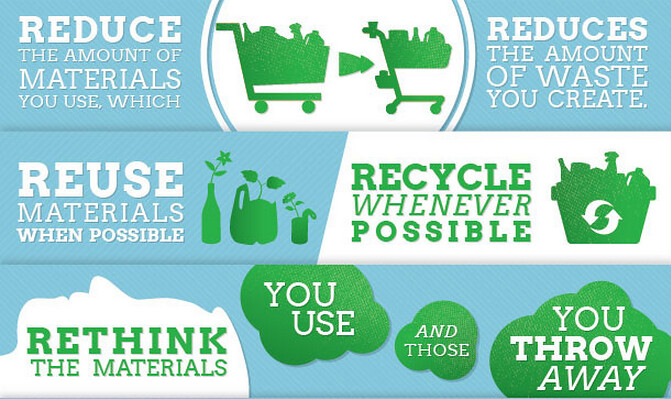
Most of us feel virtuous when we drop something into the recycle bin. It makes us feel like we’re doing our part to save the planet. As admirable as it is to use recycle bins, it is not the whole answer. Studies show that the more we recycle, the more plastic we use overall. In other words, recycling is giving us permission to use more plastic. And that isn’t going to get us anywhere.
In addition, in 2018 China began refusing to accept baled mixed-stream waste from the U.S. It isn’t an option any more to stuff the contents of millions of recycling bins onto container ships and send it to China. We have to clean up our own mess.
We can no longer rely on recycling to mitigate our environmental impact. To really reduce the amount of plastic that is going into the landfills, we need to put a new focus on three familiar goals:
- Reduce the amount of waste material we generate, even if it is marked recyclable. Better recycling begins before we even check out of the grocery store. Deciding we really don’t need an item also lowers the costs to the environment that would have been caused by the energy needed to obtain the raw materials, create the item and transport it.
- Reuse: This combines reusing materials (like using an old T-shirt as a rag) and purchasing items that can be reused (like a reusable water bottle). When items are reused, consumption is reduced; the amount of energy required to create those items is reduced, the amount of pollution generated to create the item is reduced, and less goes to the landfill.
- Recycle: Glass and metal are recyclable indefinitely. Paper can be recycled 5-7 times. Plastic can usually be recycled only 2-3 times. Put only recyclables in recycling bins. Dropping nonrecyclables into bins results in contamination and the loss of quantities of materials that could otherwise have been recycled. One out of every four items put in a recycling bin cannot be recycled. When in doubt, throw it out.
Below are just a few ways we can build off these concepts:
Reduce
- Reconsider: Do I really need this?
- Refuse: Straws, freebies you will take home and forget about.
- Buy items (like yogurt) in a large container and divide it into smaller reusable containers.
- Think before purchasing individual-size anything.
- If it will leave behind plastic trash, don’t buy it.
Reuse
- Have reusable water bottles. Get a basic purifier for your home if you don’t like tap water.
- Take a reusable mesh bag for vegetables at the market.
- Take your own reusable takeout containers instead of accepting a Styrofoam clamshell.
- Always have reusable shopping bags in your car or purse.
- Reimagine: Think about other uses for your item. Can you use it instead of buying something new?
- Purchase items used instead of new
Recycle
- Know what your community will recycle.
- Take advantage of community collection days for electronics.
- Don’t be a “wishcycler:” if you aren’t sure an item is recyclable, put it in the trash.
A couple of other entries into the traditional “Reduce, Reuse, Recycle” mantra include:
Rot
- Start a compost pile.
- Know the terms. A takeout cup or box might be labeled “compostable” but it may only be compostable in an industrial composting facility.
- Composting with worms (vermicomposting) is an easy way to get rid of organic waste without sending it to a landfill.
Repair
- Fix it instead of discarding it.
Re-gift
- One man’s trash is another’s treasure
Upcycle
- Tap into your creativity
No one expects you to completely change your habits overnight. Pick three ideas from above and try them out this week. Next week, pick three more. Make changes you can live with, but try to stretch your envelope just a bit.